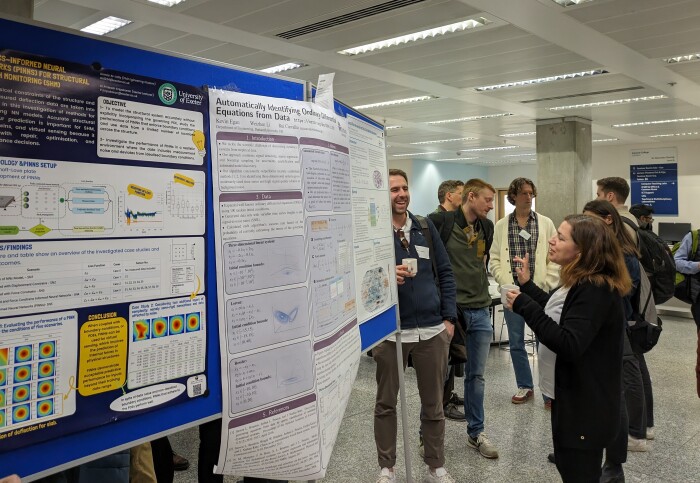AI Meets Maths: Imperial-hosted AI UK Fringe event explores physics-informed AI
by Gemma Ralton

Imperial departments partnered with Leeds University and The Alan Turing Institute for a workshop on physics-informed machine learning for AI UK 2024.
Imperial’s Data Science Institute and the National Heart and Lung Institute partnered with the Leeds Institute for Data Analytics and the Leeds Institute for Fluid Dynamics on an afternoon workshop, flash talks and poster competition exploring the latest developments in physics-informed machine learning for AI UK 2024.
AI UK is a national showcase of data science and artificial intelligence, hosted by The Alan Turing Institute. In parallel with this, the AI UK Fringe events bring together leaders in academia from across the UK’s AI ecosystem to demonstrate, exhibit and update on their ground-breaking work.
Over 150 students, academics and industry practitioners from all over the UK attended the workshop, led by Research Fellow Dr Marta Varela Anjari.
Commenting on the huge success of the workshop she said: “The resounding success of our fringe event at the AI UK showcase not only surpassed attendance expectations but also illuminated the burgeoning enthusiasm for physics-informed machine learning.
As attendees embraced the fusion of physics principles with cutting-edge AI technologies, it became evident that the future of innovation lies at the intersection of these disciplines.”
Physics-informed machine learning is important because it combines the strengths of physics-based models and data-driven approaches, resulting in interpretable, generalisable and efficient models, with applications across fluid dynamics, materials, climate and environment, astrophysics and biomedicine to name just a few.
Multi-disciplinary talks and posters
Throughout the day, attendees heard from a number of keynote and flash talks across many different disciplines.
Dr Rossella Arcucci Director of Research at the Data Science Institute opened the day, and Professor Nathan Kutz from the University of Cambridge was the first keynote speaker. His talk focused on ‘Accelerating Scientific Discovery with Machine Learning’.
Throughout the day, attendees heard two more keynote talks from Dr Alice Cicirello from the University of Cambridge on ‘Physics-Enhanced Machine Learning in applied mechanics’, and Professor Luca Magri from Imperial College London who’s talk focused on ‘Scientific Machine learning to predict chaotic dynamics.’
The flash talk competition was an opportunity for researchers to present their work in the form of a 3 minute talk. The flash talk competition was won by Phil Livermore from the University of Leeds for his talk on 'Reconstructions of Jupiter's magnetic field using physics-informed machine learning'.
Alongside this, participants could submit posters for a competition and poster session. The prize for the best poster was given to Anmar Al-Adly from the University of Exeter for their poster on 'Physics-Informed Neural Networks for Structural Health Monitoring.'
Article text (excluding photos or graphics) © Imperial College London.
Photos and graphics subject to third party copyright used with permission or © Imperial College London.
Reporter
Gemma Ralton
Faculty of Engineering



